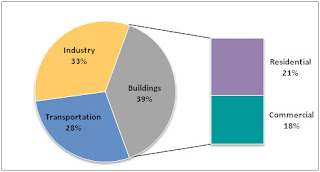The idea for the program, Property Assessed Clean Energy (PACE) originated in Berkeley, and San Francisco will begin implementation in March. Through the program, $150 million dollars in bonds will be available for property owners who want to make renewable energy, energy efficient and water conservation improvements. The loan is then paid off through a voluntary assessment on the property taxes over the course of 20 years. The loan stays with the property, rather than the homeowner. The new homeowner will also reap the energy efficiency and reduced utility bills as the previous homeowner.
The money from the bonds are meant to off-set the high upfront costs of installing renewable energy improvements, such as installing solar panels. Residents are given the option of switching to renewable energy even if the transition to do so would normally not be financially possible. This can have a remarkable impact on our greenhouse gas emissions. The graphic below, from the Pew Center on Global Climate Change, illustrates the huge amount of energy that buildings in the United States use.
Figure 1: Buildings Share of U.S. Primary Energy Consumption (2006)

 PACE advocates also claim that this can be a way to stimulate the economy and create green jobs, while meeting the needs of residents who are eager to make energy efficient improvements to their properties or transition to renewable energy. However, the huge upfront cost is often cited as a significant barrier to making these upgrades. This program solves that problem while also ensuring that people of different means are able to reap the benefits of lower utility bills and reduced emissions.
PACE advocates also claim that this can be a way to stimulate the economy and create green jobs, while meeting the needs of residents who are eager to make energy efficient improvements to their properties or transition to renewable energy. However, the huge upfront cost is often cited as a significant barrier to making these upgrades. This program solves that problem while also ensuring that people of different means are able to reap the benefits of lower utility bills and reduced emissions.All of this happens without demanding additional funding from municipalities. When the economy suffers, it is easy to neglect or set aside concerns about the environment in an effort to create more jobs or stimulate economic growth. This program prevents local governments from having to make that choice without depleting their limited financial resources.
The support for PACE programs has been significant. Scientific America named it one of twenty ideas that will change the world, and 16 states have adopted similar programs. This includes the city of Milwaukee in Wisconsin, with a program named Me2.
With so much support behind this program, and its seemingly win-win method of achieving environmental protection, creation of green jobs and environmental justice all without relying on extra funding from cities with limited financial resources, should Minnesota consider adopting PACE for its cities?
This is a very creative idea. I assume that the large up front costs of "green upgrades" are one of the most significant barriers to expanded implementation. If a person isnt sure that they will stay with a property for long enough to reap the benefits of energy savings, they will have little incentive to pay the up front cost. I like that the PACE program ties the loan to the property rather than to the individual.
ReplyDeleteI wonder if a similar strategy could be used in other situations as well. The plan to assess businesses on University Ave. in St. Paul a fee for streetscape improvements comes to mind. It seems unfair to force current businesses to pay the full cost of improvements such as new trees and streetlights, when the benefits will last for decades.
-Spencer
Everyone should applaud San Francisco property owners, who are willing to support this initiative even in such a budget situation.
ReplyDeleteI am curious about the distribution of related benefits and costs. The green updates will not only help local residents in energy saving, but also have substantive positive externalities to others. Are localities having sufficient incentives to pull up those deals?
Legislation has been introduced this session in the legislature that would enable local governments to set up PACE programs here in MN. Currently, MN law does not allow "public funding" to pay for improvements to private property. There is apparently considerable support from key legislators for this legislation. However, Prentiss Cox of the Environmental Law Clinic apparently will give a presentation arguing against the idea on legal grounds, though I know none of the substance of his argument. I will be attending this presentation and will be happy to share information with anyone else interested in coming. My research and advocacy has focused on this idea and I will be happy to talk more about it with anyone who is interested.
ReplyDelete